‘Boating while high’ on the rise
Published on July 31st, 2018
Since recreational use of marijuana became legal in the state of Oregon in 2016, pot use among boaters and rafters on the Rogue River and other bodies of water has become almost as common as a cooler full of beer.
Under Oregon boating laws, boaters are allowed to drink alcohol if they are of legal drinking age, and they may also have open containers of alcohol on board. However, they are not allowed to be intoxicated while operating a boat – and that includes being one of several paddlers on a raft, according to the law.
Boaters follow the same standards as automobile drivers, with those exceeding a .08% blood-alcohol level considered over the limit.
With marijuana, the rules are somewhat different.
While it is legal to have an open container of alcohol on a boat, it is illegal to smoke pot in public, and Oregon waterways are considered public.
“It’s legal at home, but you still can’t operate a boat,” marine police officer Jason Denton told the Associated Press. “We get a lot of people who maybe aren’t specifically coming here to do that, but it’s on their agenda. It’s become more mainstream.”
Statistics show now that marijuana has joined beer, wine and other intoxicants for rafters and other boaters to imbibe during their adventures there’s definitely more smoke on Southern Oregon rivers.
Marine police across the Pacific Northwest state have so far this year logged 39 cases of boating under the influence of intoxicants, with 36 of those coming from just two southern counties. That leaves just three other cases for the 30 other Oregon counties that have Marine Board-funded law enforcement. Marijuana impairment has been involved in 30% of those cases.
There are no breathalyzer tests for cannabis, so officers rely on field-sobriety tests to analyze whether pot-impairment levels rise to the level of Boating Under the Influence of Intoxicants (BUII). In at least two cases, officers received over-the-telephone warrants to draw blood or urine from suspected marijuana-impaired boaters.
While national statistics show that people tend to have either marijuana or alcohol as their substance of choice, Oregon’s BUII cases that involved marijuana almost always have included alcohol too. Those convicted of BUII face fines and potential loss of their boater-certification cards needed to operate boats with motors greater than 10hp.
Marine law enforcement officials hope to host statewide marine-deputy training for marijuana detection in a pot version of a ‘Wet Lab’, which is when police have someone drink alcohol and then test their abilities to detect impairment.
This ‘Green Lab’ might be tough to pull off, because marijuana remains illegal on the federal level, but federal officials are warming to the idea of field officers becoming more adept at pot-use detection.
Source: IBI News









 We’ll keep your information safe.
We’ll keep your information safe.